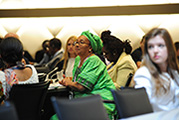MÁS INFORMACIÓN:
A session organized by the permanent missions of the United Kingdom and Australia and the International Trade Centre (ITC) concluded that trade can only be truly inclusive if women worldwide are empowered. Despite the economic gains offered by trade, only one in five exporting companies are owned by women and 90 per cent of countries have at least one law discriminating against women, said Arancha González, the Executive Director of the ITC. The session also highlighted that many women lack confidence and the technical and financial capacity to engage in trade.
To help women access new markets, the panel called on the international community to tackle the challenges faced by women, particularly in small and medium-sized enterprises (SMEs). The Managing Director of Kenya’s GreenBell Communications, Rose Maghas, stressed that stereotypes in Kenya made it challenging for women to become truck drivers, for example. Promoting positive role models is essential said Susan Barton, the Trade and Gender Leader at the UK’s Department for International Development. The ITC introduced a new platform, SheTrades.com, that promotes the role of women in business by connecting buyers with women-owned enterprises worldwide.
Sharlene Gawi from Papua New Guinea shared a success story regarding 500 women who export a locally produced string bag called a “billum”. A training programme has helped them overcome a variety of challenges, such as the inability of some of the workforce to fill in documents because of illiteracy or not knowing their birthdate.
A session organized by the International Network of Women Engineers and Scientists (INWES) presented how various stakeholders are helping to enhance the participation of women in engineering worldwide and to achieve a greater gender balance. Despite a high female presence in studying engineering, only 5 per cent pursue a career in this traditionally male domain.
Adopting the right governmental policies — such as the introduction of quotas – can be a game changer, panellists said. Access to finance, information and communication technology, capacity-building, peer mentoring and greater transparency were highlighted as important tools in working towards greater equality in the engineering sector. The panel also stressed the important contribution women can make towards achieving the UN’s Sustainable Development Goals — particularly regarding gender equality, education, decent work and economic growth.
A session organized by the International Trademark Association brought together women from various regions (Africa, Asia, North America and Latin America) who are active in the field of intellectual property. The panellists noted that women are generally under-represented in this domain, due to the fact that fewer women are pursuing studies in this area and due to traditional gender imbalances in the legal community. Smaller firms tend to hire more women, but offer lower salaries and more limited career prospects. The panellists discussed the importance of building diverse networks to enhance women’s participation in intellectual property.
A session organized by the Enhanced Integrated Framework (EIF) opened with real-life examples of women who have successfully developed businesses through trade, with the support of the EIF, resulting in women being empowered in local communities. They identified rapid poverty reduction, inclusive economic growth and sustainable socio-economic development as the main goals of empowerment. The businesses highlighted in the case studies included the export of mangoes from Mali, the manufacturing of silk clothing in Cambodia, and tourism services in the Solomon Islands.
Speakers noted how trade plays a central role in empowering women. Companies that actively trade tend to demonstrate better respect for the rights of women in areas such as family care and maternity leave. In addition, companies connected to global value chains often offer higher wages and their employees enjoy better working conditions. Nevertheless, women in some countries still face challenges in securing equal rights with men in areas such as land title rights, and still face barriers such as patriarchal cultural practices. In short, involving women in trade leads to more growth, which has benefits for society as a whole.
A session organized by SPINNA Circle Ltd focused on what steps could be taken to empower women in the fashion and textiles industry. The speakers said that women make up a majority of workers in the garments and textiles industries in many parts of the world.
The session started with a discussion of what is needed to expand the industry and thereby to help women. Win Ei Khine, Executive Director of Maple Trading Co. Ltd in Yangon, Myanmar, said four things are needed: government support to expand the supply chains of garments and textiles industries, financing to help small and medium-sized enterprises grow, room in the business sector for women leaders, and a stable economy.
Belinda Edmonds Offord, Executive Director of the African Cotton & Textile Industries Federation (ACTIF), said many businesses in Kenya, for example, are crippled by the lack of financing.
Elsbeth Akkerman, Deputy Permanent Representative of the Netherlands to the WTO, said: “Government has a responsibility to be an enabler.” She added: “The WTO’s Trade Facilitation Agreement can help by stimulating cross-border trading and cutting red tape.”
> Si tiene problemas para visualizar esta página,
sírvase ponerse en contacto con [email protected], y proporcionar detalles sobre el sistema operativo y el navegador que está utilizando.

